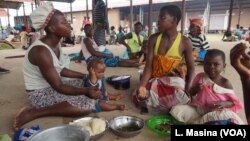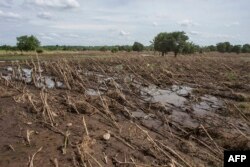U.N. agencies are making preparations to provide emergency aid to hundreds of thousands of victims of Tropical Cyclone Idai in response to appeals from the governments of Malawi and Mozambique.
The hugely destructive storm, the largest in at least a decade, made landfall Thursday near the heavily-populated Mozambican port city of Beira. This has aggravated the severe flooding, which has been creating havoc over the past week in southern Malawi and eastern Zimbabwe.
U.N. agencies estimate more than 900,000 people in Malawi and 600,000 in Mozambique are affected by the heavy rains and flooding. Scores of people are believed to have been killed and injured, and tens of thousands left homeless.
Precise figures will not be available until aid agencies gain access to all areas of the affected region and are able to fully assess the damage. The World Food Program says it had pre-positioned a small amount of food in the region before the cyclone hit and has distributed a limited amount to some of the victims.
The agency says it is preparing a large-scale operation to meet the enormous assistance needs. World Health Organization spokesman Christian Lindmeier told VOA his agency also is making preparations to deal with the huge health needs likely to result from this disaster.
‘Following the flooding, which is coming with the rains, you have of course the risks of drowning and victims. But you also have crush and trauma injuries through the flooding. This is typically followed then later by water-borne diseases, the rise of air-borne diseases like malaria could also be expected,” he said.
Lindmeier said the mid and long-term effects that result from extensive damage to infrastructure and health facilities can be very serious. He said assistance to pregnant women or delivery of aid to diabetes patients could be hampered.
Aid agencies are doing their best to provide assistance while the cyclone plays out. But this is very difficult. They say many areas are inaccessible due to the flooding. They say the airspace over Mozambique is closed for the moment because of the weather, so flying in relief supplies for now is largely stalled.
The agencies say they are bracing for another possible disaster as the cyclone moves toward Zimbabwe.





